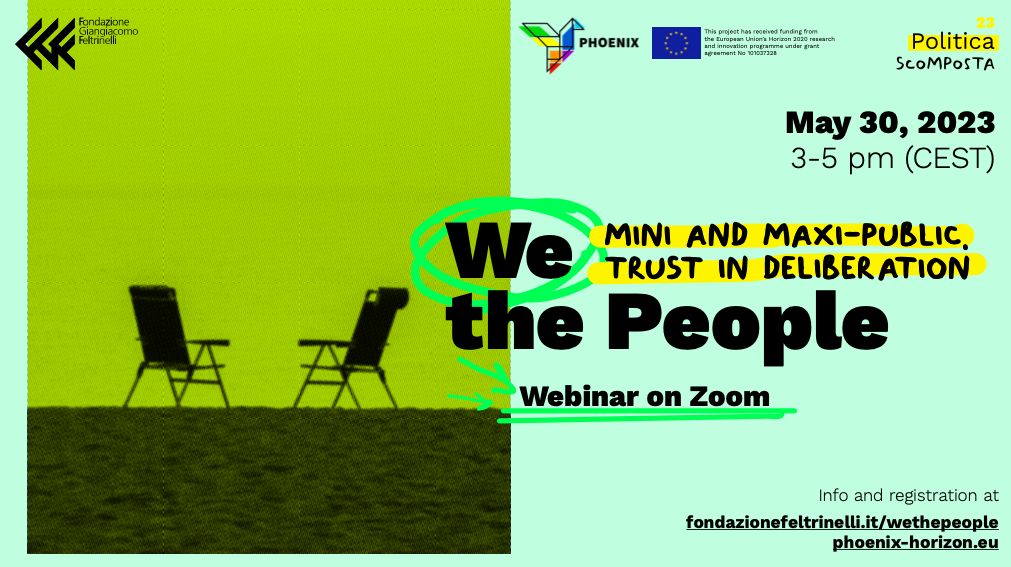30 May 2023 | 3-5 pm (CEST)

Mini and Maxi Public: Trust in Deliberation
Deliberative democracy requires a trade-off between the quality and quantity of participation.
We cannot conceive participatory processes able to include all citizens, so a selection criteria must be established for engaging participants. Participants will be asked to represent faithfully the interests and opinions of larger communities, which poses a challenge on the degree of representativeness of the sorted mini-public.
How can we turn the democratic lottery into a successful selection process? How to make sure that selection, communication, and engagement processes are as inclusive as possible? Trust is essential for making the output of deliberation legitimate.
Indeed, most of those who are not active participants are tempted to feel mistrust with respect to what happens in any process of deliberation that they could not join. Therefore, the dilemma lies in making the outputs of the mini-public acceptable to the larger community by enhancing trust and confidence in the process. To achieve this, transparency and adequate publicity of the ongoing work are needed.
In our first webinar of the series We the People: The Rise of Citizens’ People, we will reflect on the selection and engagement of mini-publics, and explore how to improve the recommendations arising from a respectful, debate-centered, and potentially conflicting deliberation in the participatory arena.
Main speakers
Giovanni Allegretti, Universidade de Coimbra and Phoenix Horizon.
John Gastil, Professor of Communication Arts & Sciences and Professor of Political Science (Penn State University).
Roundtable participants
Stefano Sotgiu, Prossima Democrazia
Yves Dejaeghere, Federation for Innovation of Democracy in Europe
Marco Meloni, University of Southampton
Riccardo Ladini, Università degli Studi di Milano
Victoria Solé Delgado, Scuola normale Superiore
Enrico Biale, Università degli Studi del Piemonte Orientale
Agenda
15.00 – 15.05 Welcome greeting by Luca Novelli, Fondazione Giangiacomo Feltrinelli
15:10 – 15.30 Speech by Giovanni Allegretti
15.30 – 15.50 Speech by John Gastil
15.50 – 16.00 Break
16.00 – 16.40 Roundtable
16.40 – 16.55 Q&A from auditors
16.55 – 17.00 Closing remarks
About "We the People. The Rise of Citizens’ Voices"
Is it a crisis of democracy, or rather a crisis of participation within democracies, that we are facing? What factors contribute to the growing tendency to limit citizens’ involvement in the electoral process?
The issue of the complex, yet virtuous, relationship between information, liberal democracy, and the market economy has been extensively researched and analyzed. Recent high-tech innovations have posed significant challenges as they occurred amid geopolitical transformations, such as the end of the bipolar world, the European Union’s rapid expansion, and the collapse of the social prestige of the intermediate bodies. These changes have occurred alongside dramatic globalization, the rise of neoliberalism, and a prevailing culture of narcissism and individualization.
As a result, we find ourselves in a representative system that fails to adequately address people’s demands. The only way out of this democratic deficit is a renewed and fruitful dialogue between the public and institutional spaces. How can we reconnect citizens with administrative representatives? How can we overcome the top-down technocratic management and ensure that citizens’ voices actually contribute to policy co-creation? To answer these crucial questions, we must explore the trends of Democratic Innovations (DIs) and the potential benefits of the improvement of digital democracy.
Deliberative and participatory democracy becomes even more vital if we aim at pursuing the green transition, as any transformative process requires broader support to be efficient. Moreover, we cannot achieve an equal, just, and sustainable Green Deal unless we acknowledge the interests of those who will mostly be impacted by decision-making.
On the other hand, a technocratic approach will result in backlash, as there is no flawless and encompassing solution that can be posed to the climate crisis and get a unanimous consensus. What matters, instead, is that throughout the process, people’s needs are duly considered, debated, and represented.
This is the driving force that inspires the work of the PHOENIX Project: to gather civil society, stakeholders, practitioners, and anyone capable of contributing valuable discourse while advocating for the interests of the least represented and advantaged individuals in society.
The purpose of this series of webinars is to empower participants to become acquainted with the latest trends in Democratic Innovations while investigating the potential and the obstacles facing participatory and deliberative democracy. Following each workshop, we will contemplate how to foster participation beyond the local level and include the interests of minorities by placing them in the context of larger citizen groups. We will reflect on the conditions for thriving participatory processes based on mutual trust and respect, and whether such democratic experiments can actually reduce the gap between participation and representation.
Next webinars
21st June The role of platforms in connecting mini and maxi-publics.
6th July The hard life of a facilitator: deliberating on complex issues
7th September How to perform your interests during deliberation. Democracy beyond the exit strategies

Follow us on: